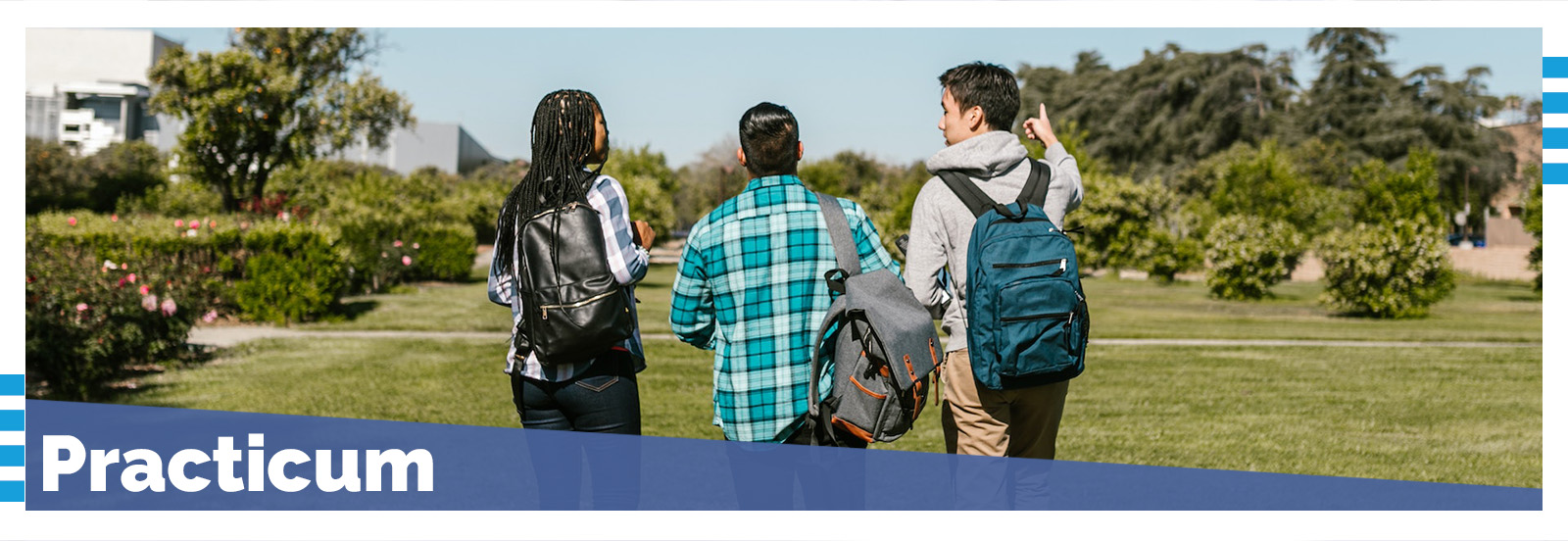
Practicum
What is Practicum?
Practicum is an experiential and service-learning connection between the classroom and real-world public health practice to test skills and approaches, gain first-hand workplace intelligence, and develop conceptual and practical knowledge.
It is an integral component of the Master of Public Health curriculum. It involves the placement of the student in a community, governmental, non-governmental, for-profit, or relevant academic setting based on career interests and availability.
The student will complete 180-hours of experiential learning and service on a mutually agreed-upon project that is approved by the Office of Experiential Learning and Career Services (OELCS) under the guidance of their Practicum preceptor, who serves as a mentor and supervisor at the same time.
Who can do the Practicum and when?
MPH students who have completed at least 18 semester credits of program coursework can start their Practicum. It is recommended that students prepare for the Practicum at the beginning of the semester in which they will complete their 18th credit of graduate coursework, or 4-6 months before the semester in which they plan to do the Practicum.
Students must complete Practicum orientation, have an approved placement, and have an approved and signed Public Health Practicum Contract to start the Practicum and enroll in PUBH 7985 course.
How to Get Started?
The Practicum is a student-led, time-intensive activity with the support of the faculty advisor, the OELCS Coordinator, the organizational preceptor, and the PUBH 7985 instructor.
Step 1: Discuss with the faculty advisor and attend a Practicum orientation session.
Step 2: Complete the Practicum Survey and schedule an appointment with OELCS to discuss career interests and goals and determine available Practicum locations.
Step 3: After identifying potential positions, students should apply (if applicable) to the Practicum site or seek approval from OELCS to contact them.
Step 4: This is a time-intensive activity. Once you receive an offer or confirmation of the Practicum placement, meet with your Practicum preceptor, faculty advisor, and OELCS coordinator to complete the Student Request Form, Public Health Practicum Contract, and any other required paperwork, which may include waivers, background checks, work authorization (for international students), and immunization records.
Step 5: The student submits the Public Health Practicum Contract and other required paperwork signed by all interested parties to OELCS. OELCS authorizes enrollment to PUBH 7985. The student can start Practicum and participate in PUBH 7985.
Students in online MPH programs: MPH students enrolled in online programs should find a Practicum location in the area they reside in. They may discuss with the faculty advisor and/or contact the OELCS for assistance. They follow the same steps as described above. The practicum orientation and associated meetings will be held via Teams.
What happens during Practicum?
MPH students are required to complete 180 hours of learning at the Practicum location, 20 hours on the literature review and attend the PUBH 7985 workshops.
Monitoring of the student’s progress will be accomplished by meetings between the student, PUBH 7985 course instructor and/or Practicum preceptor. If problems or concerns cannot be resolved, students should refer to the OELCS Coordinator.
All students are required to prepare and submit the following assignments to the PUBH 7985 instructor:
- Practicum Portfolio, to document their learning experiences during the Practicum,
which is composed of:
- Cover sheet
- Student Practicum Checklist
- Public Health Practicum Contract
- Resume
- Practicum Report (3-page double spaced pages in total)
- Describes the organization (overview) and the nature of the practicum project.
- Describe the experience (types of activities).
- List the three foundational and two concentration competencies selected and how they were addressed. (Refer to Practicum Contract)
- Describe the two deliverables selected and how they addressed the competencies.
- Two deliverables that provide evidence of your competency attainment. Deliverables may include projects, videos, spreadsheets, websites, posters, photos, curricula, policy briefs, summaries of analyses, etc.
- Daily Log of Activities Form
- Evaluation Forms
Need Assistance?
The OELCS Coordinator facilitates opportunities, solicits placements, and informs potential Practicum preceptors about the Practicum policies and requirements. Students should complete the Practicum Student Request Form at least one semester before Practicum and PUBH 7985 enrollment.
Practicum site locations vary based on the student’s area of concentration, academic and career goals, and availability. OELCS will assist students in finding a practicum location within the Memphis community (if needed). Students can utilize their workplace as their practicum location if approved. Remote options may be available.
International Student Resources
For international students, please visit the University of Memphis Curricular Practical Training (CPT) page to learn more about CPT requirements. Completion of CPT is mandatory for the Fieldwork and Practicum courses. To apply for CPT, use the University of Memphis CPT Application Form and reference the School of Public Health Academic Services Coordinator Shirl Sharpe at ssharpe@memphis.edu for the faculty signature and recommendation.
Additional Resources
Benefits of the Practicum
Hands-On Experience: Students apply theoretical knowledge gained in the classroom to real-world public health challenges, enhancing their skills and understanding.
Networking Opportunities: Our community partnerships allow students to connect with public health professionals, mentors, and organizations, building their professional portfolio and increasing future career opportunities.
Community Engagement: Students work directly with community members to reduce health disparities, promote health education, and establish evidence-based interventions, positively influencing public health outcomes.
Personalized Support: Our dedicated faculty and staff work closely with students to identify practicum placements that align with their interests, career goals, and areas of concentration, ensuring a meaningful and enriching experience.
Professional Development: Throughout the practicum, students receive mentorship, feedback, and guidance to support their professional growth as emerging public health professionals.


